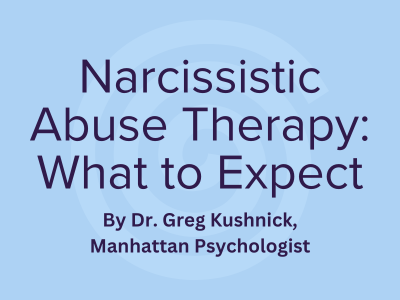
Narcissistic Abuse Recovery Therapy in NYC: What to Expect
In my years of experience as a psychologist in NYC, I have come to the conclusion that the hardest part of therapy for people who have endured narcissistic abuse from a romantic partner, parent, sibling or boss, is actually starting therapy in the first place.
Everything else seems to unfold with greater ease once the process begins. It’s as though everything you’ve endured in an abusive relationship with a narcissist has created a wave of resistance, an uphill climb through self-doubt, guilt, shame and confusion that dilutes any effort to take care of your mind and body. However, once you place yourself in a safe therapeutic space for processing the abuse with an experienced psychologist, something shifts.
An amazing thing happens. You start to learn who you are separate from the abusive relationship. You see the tactics of the narcissist more clearly and you start to respond differently. You learn how to begin to set better boundaries that give you a sense of mental freedom and control. You feel like you have more of a sense of choice. Narcissistic Abuse Recovery Therapy can change your life if you let. I have seen the effects over my 20+ years as an NYC psychotherapist and it’s remarkable.
I’ll Meet You Where You’re At
I will support you at whatever stage you’re at in the relationship. Some people come to therapy needing help to leave an abusive relationship. Others have already left and are needing assistance with the fallout of the separation. And some people have decided to stay in a relationship with the narcissist because of other factors like the presence of shared children or a work situation they cannot yet end. I will meet you where you are. No judgment. Let’s help you to get a handle on the difficult aspects of exposure to narcissistic abuse.
Manage Shame and Self-Doubt
The main psychological weapon of choice for narcissistic individuals is self-doubt. As long as you are questioning yourself, foggy minded, ambivalent, confused and shameful, the narcissist has control. I help my clients come out from under this blanket of self-doubt. It’s so liberating when it happens and it’s one of the most gratifying parts of my job as a therapist who specializes in narcissistic abuse in New York.
Learn the Tactics of Narcissistic Abuse
I will make it easy for you to understand the specific tactics of the person who is manipulating and harming you. As a result, you will be more prepared with a variety of tactics for feeling more empowered to cope with actual exposure to this individual or memories of troubling interactions with this person. My methods tend to be quite effective, especially for clients who are motivated to create something better for themselves.
Discover Who You Are Separate from the Relationship- Find Yourself!
Therapy for narcissistic abuse involves trying to come to terms with the treatment you’ve endured at the hands of a narcissist, and in that process is figuring out who you are separate from the relationship. Years spent as the child of a narcissistic parent has most likely conditioned you to think about yourself, your value, your abilities in terms of how he or she wanted you to think and feel. The same goes for a spouse or shorter-term romantic partner. Therapy will help you plug in to who you are and who you want to be for yourself and the world.
I find this work incredibly fulfilling and I’d love to have the opportunity to help you.
For more information about me and my approach, please consider listening to The Mental Illness Happy Hour podcast on narcissism on which I was a guest. Here is another the link to the podcast on Apple Podcasts.
If you’re not whether or not your partner is a narcissist, please take a look at my article on the signs of narcissism. As a therapist who specializes in narcissistic abuse recovery, I have seen so many different manifestations of abuse, so I am well-equipped to handle most issues related to narcissism.
Please feel free to reach out to me with any questions about getting started in therapy for narcissistic abuse in New York City. I offer in-person CBT therapy and online therapy from my Chelsea office.
All the best to you!!
Greg Kushnick
Learn More
9 Signs You’re in a Relationship with a Narcissist (as Seen on Huff Post)
I’m going to talk about the unhealthy kind of narcissism so you can get a clearer idea of what we mean by healthy narcissism.
If you suspect (or already know) that you are in a relationship with a narcissist, it’s important to work on the unhealthy ways in which his or her narcissism is manifested.
9 Signs You’re in a Relationship with a Narcissist
Here are nine signs you and your partner need to be immersed in a month-long course on healthy narcissism:
1) Your partner can’t tolerate your success.
One giveaway would be if you and your partner cannot be successful at the same time. Instead, you always find yourself in a one-up-one-down situation in which one of you can only thrive at a time.
2) You have suspicions that your partner lacks basic empathy.
How many times have you witnessed your significant other insulting other people with very little justification for his harsh words? (This can be a sign of other personality disturbances as well.)
3) Your partner has trouble supporting you emotionally during small, everyday situations that upset you, but when terrible events are happening, he or she loves the feeling of being needed and steps into the supportive role with ease.
Some narcissists require you to need them in order to ignite their powerful, caring side.
4) Your partner is extremely successful in his or her career and it seems like he or she has stepped on other people’s heads to achieve an elevated status or title.
Yes, many narcissists run the show. This is where narcissism can be a blessing as much as a curse.
5) More than a few people have described him or her as “self-referential.”
Yes, another dead giveaway is when your partner is constantly thinking or saying, “What does this say about me?”
6) A textbook sign of narcissism is that your significant other constantly needs to be admired.
Does it seem like your partner looks inward to find value or does the world need to reflect his or her greatness…all of the time?
7) It’s implied that you always have to let go of your needs and meet your partner’s expectations for how a particular situation is supposed to happen.
Do you have an equal say in what you do together? Is he or she constantly punishing you for not meeting expectations?
8) Your partner shows a huge blindspot in recognizing how his or her actions impact other people.
This is also about empathy, but I like to talk about it more in terms of someone lacking the ability to place him- or herself in your shoes and see the world from your eyes.
9) Your partner tends to speak with pathological certainty when sharing his or her own opinions.
Pathological certainty is when someone seems like they’re in the business of making other people bad or wrong. It’s as though they’ve made the choice to be right instead of happy. Many narcissists always have to be right. This is the unattractive side of narcissism.
Equally as important is figuring out if you’re, in fact, the narcissist in the relationship.
Whether it’s you or your partner who grapples with unhealthy narcissism, check out Techealthiest for more on how to transform unhealthy narcissism into something healthy.
More reading:
The official way to diagnose Narcissistic Personality Disorder (NPD)
Learn More